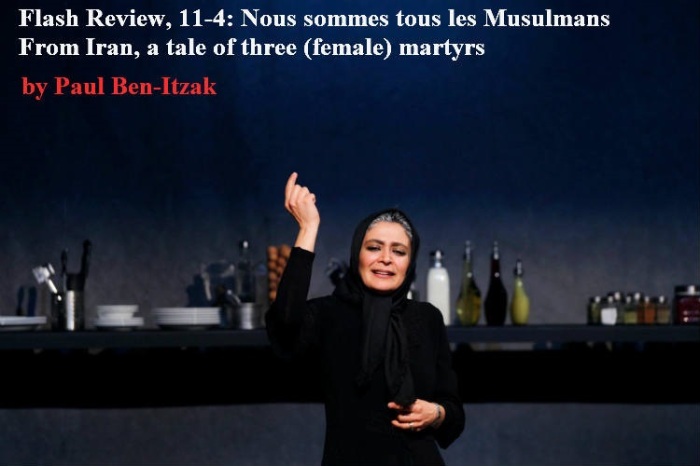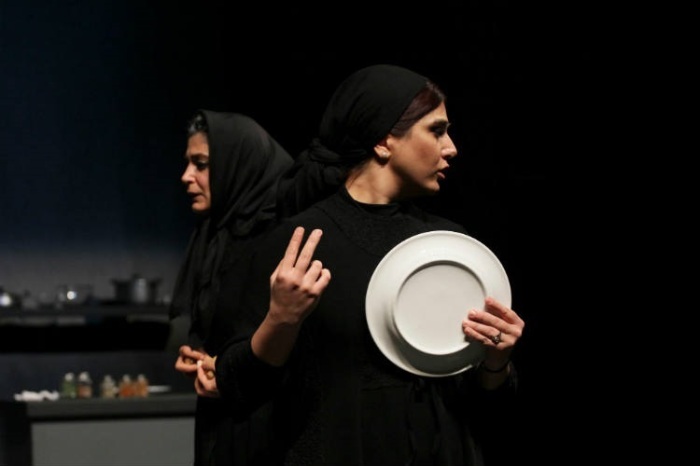 Elham Korda in Afsaneh Mahian’s production of Mahin Sadri’s “Every day a little bit more.” Reza Ghaziani photo copyright Reza Ghaziani and courtesy Theatre de la Ville.
Elham Korda in Afsaneh Mahian’s production of Mahin Sadri’s “Every day a little bit more.” Reza Ghaziani photo copyright Reza Ghaziani and courtesy Theatre de la Ville.
Copyright 2015, 2017 Paul Ben-Itzak
On Friday January 27, 2017, United States president Donald Trump issued an executive order barring from entering the United States for 90 days all citizens from seven countries with majority Muslim populations: Iran, Iraq, Somalia, Yemen, Libya, Syria, and the Sudan. On Friday night, refugees who had already been granted visas were detained at U.S. airports, among them, the New York Times reported, Hameed Khalid Darweesh, who worked for the U.S. government for 10 years in Iraq. On Saturday, after thousands turned out at New York’s John F. Kennedy International Airport to protest the detentions, a federal judge issued an emergency ruling annuling the detentions, but not the decree. If Mr. Trump’s order stays in effect, among the artists you’ll never see in the United States are the extraordinary Iranian actresses I had the privilège of seeing and reviewing here in this article first published on November 4, 2015. PS: There are, of course, larger implications of Mr. Trump’s action: On the cusp of World War II, a ship carrying Jewish refugees fleeing Hitler’s Europe was turned away from New York Harbor, the Jews sent back to face certain death. Never again.
PARIS — As I watched Afseneh Mahian’s production of Mahin Sadri’s reality-based play, “Every day a little bit more,” unfold Monday night at the Theatre de la Ville’s Abbesses Theater in Montmartre, I could not stop thinking: Why aren’t we seeing this (Iranian production) in the United States? Why is the U.S. instead actually fining the French bank BNP Paribas $8.9 billion for breaking the arbitrary American embargos against Iran and the Sudan, while the French are bringing Iranian artists to Paris to talk about other things besides Islam, terrorism, nuclear weapons, Syria, Shi’ites, Sunnis, Salafism, Wahabiism, Wassabiism, fatwahs, anti-Semitism, ayatollahs, oil, censorship, bans, and other subjects which do exist but which are not the sole facet of the Iranian-Persian (or even Muslim) identity, just as gun violence and white against black racial killings are not the only element of the American identity? Even if what’s derisively referred to here as “multi-culturalism” may get a bad rap from some sectors of French punditry, fueled by misplaced fear that it dimishes instead of enchancing the national identity, when it comes to cultural vectors — in this case, director Emmanuel Demarcy-Mota and his Theatre de la Ville team — there’s no contest: the French are infinitely more open to the world. And the pay-off is infinite. Thanks to Demarcy-Mota and these incredibly earnest and sincere artists, now whenever I hear “Iranian nuclear threat” or skepticism about Iran’s motivations in Syria, behind the word “Iranian” I can see not just ayatollic machinations and troglodyte conservativism but a people with the exact same concerns as the rest of us.
Even as I was slipping into my usual critical aloofness Monday and ‘judging’ “Every day a little bit more” on dramatic criteria, I kept pinching myself in disbelief that I was actually watching three Iranian women and their Iranian theater company permitted into the country like any other troupe to depict universal human dramas, something I could never be watching if I were in the United States. (Author’s note, 1/29/2017: When this article was original published in 2015, an American reader disputed this contention. Under Mr. Trump’s new order though, in 2017 there’s no doubt.) You may think I’m exaggerating, but when afterwards I asked Elham Korda (in English; for a people supposedly weaned on hate for “the Great Satan,” they have an amazing proclivity for speaking its mother tongue; among the Iranian contingent at the after-party Monday, English was more pre-dominant than Farsi or French) — who plays the widow of real-life martyr Major General Abbas Doran, who crashed his plane, fatally hit by Iraqi fire, into the Baghdad hotel where Saddam Hussein was planning a meeting of the non-aligned movement to send the message that Iraq was winning its war with Iran — if the play, also touring to Vienna and Brussels, would be going to the United States, she just smiled ironically.
 Elham Korda and Setareh Eskandari in Afsaneh Mahian’s production of Mahin Sadri’s “Every day a little bit more.” Reza Ghaziani photo copyright Reza Ghaziani and courtesy Theatre de la Ville.
Elham Korda and Setareh Eskandari in Afsaneh Mahian’s production of Mahin Sadri’s “Every day a little bit more.” Reza Ghaziani photo copyright Reza Ghaziani and courtesy Theatre de la Ville.
In this context it almost feels banal re-hashing the stories of the three women, involving, besides Korda’s older war widow, Baran Kosari’s mountain-climber and Setareh Eskandari’s mistress of a soccer star / wife murderer. What matters more — and I’m embarassed that my French colleagues won’t feel as obsessed with this point and will feel more free to examine the play itself without being distracted by the political externals — is that, like film-maker Abbas Kiarostami’s 1997 “Taste of the Cherry,” Mahian and Sadri, through the vessels of their credible interpreters and enabled by the Theatre de la Ville reveal Iranians as normal human beings with concerns we can all relate to. (Spoiler alert.)
Tragic ending aside, for example, Kosari’s measuring up to the male rappelers on her team reminded me of the Brady Bunch episode where Marcia decides to join the Boy Scouts for a foraging expedition and holds her own with the guys, only Marcia got more winded that Kosari’s character, based on the real-life story of the first Iranian woman to scale various mountain-tops. Korda’s character (the reason I keep referring to the actresses’ characters is that none of them were given names, just as they never got to consume the scrumptious dinner — you could smell the spicy aromas mounting as the meat sizzled — they prepared live in a real kitchen set up on stage), meanwhile, could have been an American war widow holding out hope that her husband’s body not being recovered meant he could miraculously show up any day. There are particular exceptions, confirming that Iranian women still have a long way to go: Her husband’s pension goes not to her but his father, she getting a quarter of the amount — with the precision that it’s to be devoted to the costs of raising their son, the male life still priming. And while it’s not entirely clear whether she or the soccer hero has killed his wife, Eskandari as his mistress agrees to his request that she take the fall after his ultimately false assurance that he’ll get her spared from the death penalty. But the very noting of these sexist conditions belies the notion that the Iranian government will censure anything critical of its society and policies; “Every day a little bit more” was not only presented at this year’s Tehran International Theater Festival, it won the awards for best original text and best actresses.
If I have a criticism, it’s not of the acting itself, which was appropriately direct and accordingly unembellished and dramatic when called for, but of the oddity that while the three heroines’ stories were interlaced, there wasn’t a lot of actual interaction between them; rather they related their tales directly to the audience. But the correspondence between the three journeys was clear: In one fashion or another, while each was paired with an evident male hero — the soccer player, the male mountaineering champion, the fighter pilot — in each case it could be argued that the woman’s exploits were more enduringly heroic. The mistress paid the price for her lover’s infidelity to and possible murder of his wife (the conviction and horrifyingly graphic precision of her confession makes it hard to tell if she’s making it up to cover him or really committed the act; the text could be more clear here); the mountaineer was the one ostracized (including by her own mother) after her male partner’s fatal decision to allow the participation of a mountaineer not in a state to be climbing in their expedition; and unlike him, even the martyr’s widow didn’t choose her path but had it imposed on her, and given that society treated her almost like a sub-survivor whose suffering wasn’t as important as her father in law’s or son’s, her crucible was more unjust and more enduring. It might even be argued that, in the sense that it required bucking state authority, her refusal to have her husband’s empty uniform buried in his grave for want of a real corpse demanded just as much courage. These are martyrs in their own right whose stories are as meritorious as those of the men to whose orbits they were inevitably tethered.
